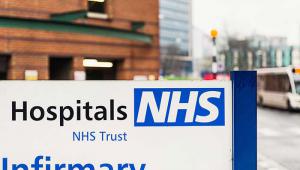In his wide-ranging review, Labour peer Lord Carter concluded there were “stark variations” in the quality of care and finances, which were costing the NHS billions.
Through expansion of best practice and ending “inexplicable variation” the savings could be unlocked by 2020/21, he said.
Carter examined 32 hospitals as well as looking at systems in the US, Germany, Australia, Italy and France for the report.
His said high quality patient care and sound financial management must go hand in hand for acute hospital trusts, which spend £55.6bn every year – over half of the total £102bn NHS annual budget.
Among the differences highlighted were variations in the price for hip replacements from £788 to £1,590, while the use of floorspace also fluctuated, with one trust using as much as 69% for non-clinical purposes.
In response, the review set out how a model hospital should operate, with recommendations including expenditure on administration should not exceed 7% by 2018 and 6% by 2020, and that unused floor space does not exceed 2.5%.
Other proposals include a new obligation on NHS hospital trusts to publish their receipts on a monthly basis for the top 100 items bought by the NHS such as bandages, needles and rubber gloves. It is forecast that greater transparency could drive down prices by as much as £1bn a year by 2020/21.
Staffing reforms include a call to introduce electronic rosters in place of outdated paper shift lists. If this could help unlock improved efficiency of five minutes every shift, £280m would be saved, according to Carter.
“To improve the quality of care hospitals must grasp resources more effectively, especially staff, which account for more than sixty pence of every pound hospitals spend,” he added.
“Giving hospitals the tools and support to better manage resources will make it easier for boards to follow the example of the best trusts and mean every patient can receive the same world class care and taxpayers will also receive a fairer return on their significant investment in the NHS.”
Responding to the findings, health secretary Jeremy Hunt said he wanted to make the NHS the safest healthcare system in the world so that it would be capable of providing the same world class care every day of the week.
“This groundbreaking review will help hospitals care for patients, making sure every penny possible is spent on frontline patient care and bureaucracy is slashed so doctors and nurses can concentrate on caring,” he added.
As part of the implementation of the review, which will be led by NHS Improvement, Carter will join the regulator as non-executive director once it is formally established in April.
NHS Improvement chief executive Jim Mackey said the service was facing financial pressure, including a six month NHS provider deficit of £1.6bn, but the efficiency work would go a long way to relieving this.
“The publication of data on hospital performance will drive up standards and help trusts exploit their vast buying power – meaning an end to the days of trusts paying wildly varying prices for routine items like needles and rubber gloves,” he added.
“We will do everything to help trusts implement these recommendations, but those that fail to do so will face closer scrutiny from NHS Improvement until they can demonstrate appropriate grip.”
CIPFA chief executive Rob Whiteman said the report contained plenty of valuable suggestions, but also showed how tough things are for the NHS.
“To ensure all £5bn of savings are achievable, particularly given the number of savings streams, will depend on implementation time needed, local variations and the difficulty of resourcing change management itself. It is also important to remember that the £5bn will be only a contribution towards the £22bn total savings assumed by the Five Year Forward View,” he added.
“Beyond the technical or cost productivity savings highlighted in the report, better system productivity is key through integration and improving the public’s health to reduce future acute burdens on the NHS. Those aims are not helped by the delayed increase of funding for the Better Care Fund support and significant cuts to public health in the recent Spending Review.”
NHS Confederation chief executive Rob Webster said it made a helpful contribution to the challenge of bringing down costs in hospitals. However, full delivery would provide less than a quarter of the £22bn in efficiencies needed overall, he highlighted.
“As we implement the recommendations, there must continue to be close engagement with the sector and a genuine understanding of the challenge NHS leaders are facing locally. The capacity to improve services and reduce management costs will be challenging. A cap on management costs, which have seen dramatic reductions in recent years, must not be a false economy.”




















